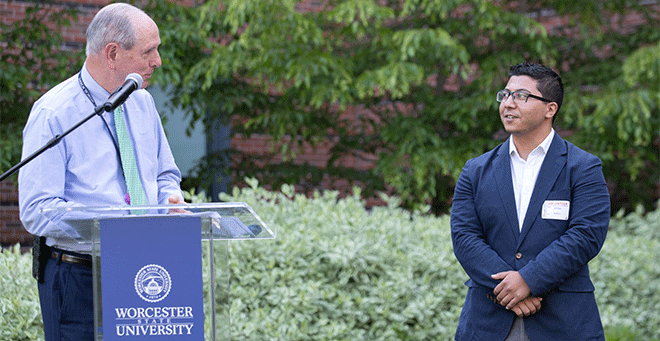Ceremony recognizes volunteers as Worcester’s large-scale vaccination site closes its doors
Chancellor Collins expresses appreciation and gratitude for collaborators and Vaccine Corps
Cheers and tears broke out inside Worcester’s large-scale COVID-19 vaccination site at Worcester State University on Thursday, June 10, after two teenage brothers received the last two COVID shots before the clinic closed.
“I was honored by my team to give the last vaccinations,” said Beth Rust, RN, director of clinical operations at the WSU site.
“I have older relatives and I asked my parents to get vaccinated so that I could be safe,” said Malachi Monroe, 15, of Worcester, who received his second COVID vaccine after his brother Conley, 14. “It’s exciting.”

Since opening in February, more than 83,000 COVID-19 vaccines were administered by more than 1,700 volunteers with UMass Medical School’s Vaccine Corps, who contributed more than 25,000 hours of service. The Vaccine Corps was the vision of Chancellor Michael F. Collins and UMass President Marty Meehan, who sought to form a dedicated group of volunteers of various ages and backgrounds to accelerate the vaccine rollout in Massachusetts. The Vaccine Corps comprises 7,200 volunteers statewide. The WSU vaccination site was a collaboration with UMMS; Commonwealth Medicine, the health care consulting and operations division of the Medical School; Saint Vincent Hospital; Worcester State University; and the City of Worcester.
“The statistics alone, do not and cannot, capture the profound sense of teamwork, purpose and camaraderie that pervaded the vaccine site and all who had the great fortune to work and volunteer there,” remarked Chancellor Collins at the ceremony.
Barry M. Maloney, president of Worcester State University; Carolyn Jackson, CEO of Saint Vincent Hospital; and Collins thanked collaborative and collegial partners who were instrumental in designing, implementing, executing and staffing the vaccine clinic. Collins presented awards of appreciation to volunteers Lisa Bennie; Nancy DeTora, MD; and rising third-year School of Medicine student Mina Botros for their dedication and commitment.
“Mina helped to recruit and train hundreds of students so that they could go out and deliver vaccines,” Collins said. “Mina, you represent the best in medicine.”
Volunteers were critical to rapidly reducing the spread of COVID-19 and in helping to allow Massachusetts to reopen.
“It was unprecedented, it was noble and it worked,” said Jackson.